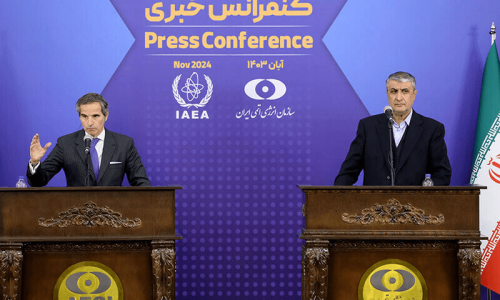KARACHI, Sept 26: The Sindh High Court prohibited on Friday any construction work on a 200-acre piece of land claimed by the Karachi Water and Sewerage Board till further notice.
The board submitted through Advocate Abrar Hasan that it acquired the land in Deh Okewara between Gulshan-i-Iqbal and Karsaz in the mid-1980s for digging a ‘gravity canal’ for equitable supply of water. While the project still awaited approval and implementation, certain individuals started construction work on parts of the land.
When KWSB officials tried to stop them from raising construction on the board’s property, the occupants said the land was carved out into residential plots in 1987 by the then chief minister, Syed Ghous Ali Shah, and allotted to them through the Karachi Development Authority, since merged into the city district government. The housing project was meant for retired government servants, who were leased out plots of various sizes.
The KWSB counsel said the (defunct) KDA or the (former) CM had no authority to carve out and allot residential plots over a piece of land owned by the board and earmarked for a water supply project.
Issuing a notice to the city district government and other respondents for a date in office, a division bench comprising Justices Munib Ahmed Khan and Rana Mohammad Shamim ordered that the status quo should be maintained in the meantime.
In two petitions moved by Advocate Amir Aziz Khan on behalf of M.A. Jauhar Co-operative Housing Society, meanwhile, the bench ordered closure of commercial offices on plots 6/A and 19-3/A with immediate effect. The society said the plots were residential were situated in an exclusively residential locality. The commercial work being transacted there by a cement factory and a builder-developer were causing public and private nuisance. The allegation was confirmed by the nazir of the court.
Promotions in EOBI stayed
Another division bench consisting of Justices Khilji Arif Hussain and Bin Yamin, meanwhile, restrained the Employees Old Age Benefit Institution from promotion of its executive officers as assistant directors in derogation of the rights acquired by three petitioner officers.
Executive officers Hamid Ali Khan, Ali Murad and Asif Khan submitted through Advocate Mohammad Nawaz Shaikh that the Eobi board of trustees decided in 2002 that the Group 6 executive officers acquiring post-graduate qualifications in business administration would be promoted as assistant directors in Group 7.
They joined a university in pursuance of the policy decision and did their MBAs. The institution paid 50 per cent for their educational expenses.
However, when they had already qualified for promotion under the subsidized education scheme and acquired vested right, the policy decision was unilaterally and retrospectively withdrawn without any notice to them or giving them an opportunity of hearing. The institution high-ups wanted to appoint assistant directors by direct recruitment or through promotion of their favourite executive officers who lacked the academic qualification prescribed by the 2002 policy decision. The petitioners said they could not be deprived of their vested rights and requested the court to direct the respondent institution to promote them.
Issuing a notice, the bench restrained the institution from issuing promotion orders of Group 6 executive officers.
Rent appeal
Justice Salman Ansari admitted a rent appeal to decide whether deposit of rent in court without a failed attempt to pay rent by money order amounted to default rendering the tenant liable to eviction.
Advocate Mohammad Jamil argued on behalf of a tenant that an additional district judge ordered his eviction for not paying his rent by money order before depositing it in court. He said Section 10 (3) of the Sindh Rented Premises Ordinance gave a choice to the tenant to either send a money order or make a deposit in court if the landlord refused to receive the amount due personally. Failure to send a money order and a direct deposit after the landlord’s refusal to receive rent did not amount to default and the tenant was not liable to eviction, the lawyer argued.
Case remanded
The bench comprising Justices K.A. Hussain and Bin Yamin remanded a case involving the liability of the Karachi Port Trust and the Karachi International Container Terminal to pay property tax to the excise and taxation department for settlement in the light of a Supreme Court judgment of 2005 and by a detailed order.
Assistant Advocate-General Adnan Karim Memon argued that under an enactment of 1910 the KPT fell within the jurisdiction of the city’s municipal limits and was liable to pay tax on its immovable property.
The court will hear an account holder’s plea against a foreign commercial bank for deposit of $ 1.1 million withdrawn from his deposit without his knowledge.
Advocate Ismat Mehdi submitted that her client, Mohammad Abdul Ajeej, a South African of Pakistani descent, visited Karachi occasionally and deposited various amounts in his ‘hold mail’ or non-checking account. When he last visited Karachi recently, he learnt from the statement of account that $ 1.1 million had been withdrawn from his account. The bank had no plausible explanation. He moved an application seeking a direction to the defendant bank to deposit the stolen amount in the court.













































Dear visitor, the comments section is undergoing an overhaul and will return soon.